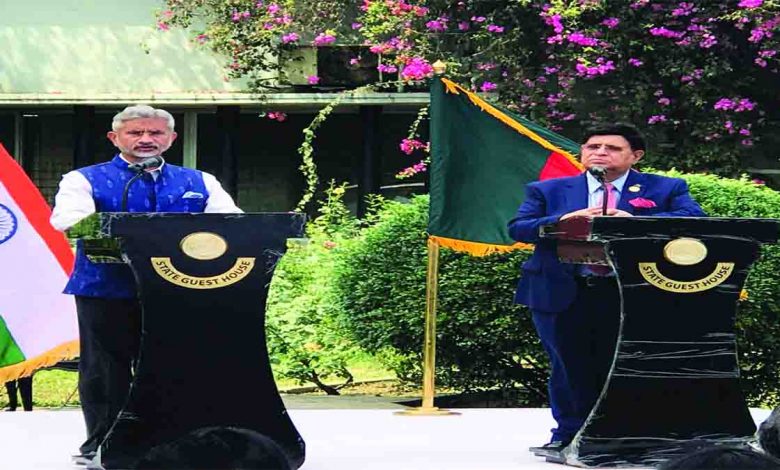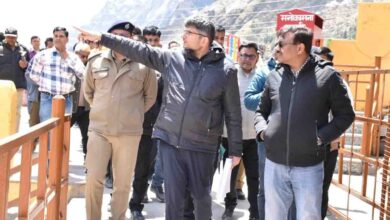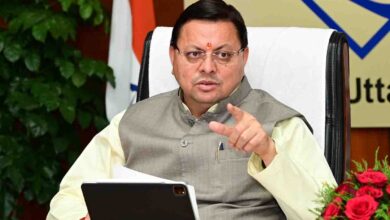India pushes for Chabahar port in international transport route

We hope member states will agree on the proposal, says Jaishankar
With India underlining the need for enhancing connectivity for development, External Affairs Minister S Jaishankar on Thursday proposed the inclusion of Chabahar port in the International North-South Transport Corridor (INSTC).
The port is in Iran and India helped in its construction. The location of the Chabahar port has the strategic advantage and potential to provide connectivity among India, Iran, Afghanistan, Uzbekistan and other Commonwealth of Independent States countries, and boost trade.
Located in the Sistan-Balochistan province on the energy-rich Iran’s southern coast, the port can be easily accessed from India’s western coast, bypassing Pakistan.
Elaborating upon the importance of the Chabahar port, Jaishankar said the shift in the fulcrum of global economic growth towards Asia is creating unprecedented opportunities for connectivity in the region.
Highlighting these points here on “Chabahar Day” at the Maritime India Summit 2021, the Minister expressed hope that member states involved with the INSTC will agree on expanding membership of this project.
Jaishankar said India has also proposed the inclusion of Chabahar in the INSTC route. It is an important trade corridor project, wherein India is partnering with 12 countries to establish an economic corridor, he said.
The International North-South Transport Corridor is a 7,200-km-long multi-mode transport project for moving freight among India, Iran, Afghanistan, Armenia, Azerbaijan, Russia, Central Asia and Europe.
“We also welcome the interest of Uzbekistan and Afghanistan to join the multilateral corridor project. Establishing an eastern corridor through Afghanistan would maximise its potential,” he said.
“I am hopeful that during the INSTC Coordination Council meeting, member states would agree to the expansion of the INSTC route to include the Chabahar Port and also agree on expanding the membership of this project,” Jaishankar said.
He also said as the world goes through a fundamental re-balancing, correcting many distortions of the past, it is only natural that connectivity should be central to that exercise. The shift in the fulcrum of global economic growth towards Asia is creating unprecedented opportunities for connectivity in the region, the Minister said.
Noting that in the modern age, the correlation between connectivity and economic growth has got even more pronounced, Jaishankar said growth in trade, commerce, industrial development and technological advancement has gone hand in hand with ease of connecting.
Maritime connectivity, in particular, has played a significant role in creating regional corridors for trade and economic linkages, as indeed for cultural and intellectual exchanges over the centuries, he pointed out and added that they too assume a new prominence in contemporary times, for being more competitive and seamless.
The access of land-locked economies to maritime movements has been a focus of recent initiatives, he said. Recognising the importance of regional connectivity, India made a landmark decision to undertake an overseas port investment in Chabahar, Jaishankar said.
While this project had been under discussion for some time, it was during Prime Minister Narendra Modi’s visit to Iran in 2016 that a trilateral agreement to establish an International Transport and Transit Corridor was signed by India, Iran and Afghanistan, he said.
Jaishankar said transport and transit corridor is intended to ensure the unhindered flow of commerce throughout the region and to create a safe, and reliable route to trade initially with Afghanistan, and thereafter with Central Asia.
The establishment and operations of India Ports Global Ltd at Shahid Behesti Port in Chabahar is the practical realisation of this important initiative, he said and lauded Ports, Shipping and Waterways Minister Mansukh Mandaviya and his team, as well as his Iranian partners, for the steady growth of the port operations.
The ongoing conclave also commemorates five years of the signing of the tripartite agreement on the establishment of a Trilateral Transport and Transit Corridor, he said, asserting that the agreement is a fitting tribute to the rich civilisational, cultural, and trade links among India, Afghanistan, Iran and Central Asia.
Jaishankar highlighted that the Chabahar port has not only emerged as a commercial transit hub for the region but also facilitated the delivery of humanitarian assistance, especially during the Covid-19 pandemic.
India also assisted Iran to fight the worst ever locust invasion in the last 25 years by supplying 25 metric tonnes of Malathion in June 2020, again through the Chabahar port, he said. The second batch of 25 metric tonnes has recently reached the port, he added.
Jaishankar said besides Indian exports of food products, the port has handled several shipments and trans-shipments from Russia, Brazil, Thailand, Germany, Ukraine and the UAE.
The virtual event, besides Jaishankar and Mandaviya, also saw the participation of Ministers from Afghanistan, Armenia, Iran, Kazakhstan, Russia and Uzbekistan.
Friday, 05 March 2021 | PNS | New Delhi






